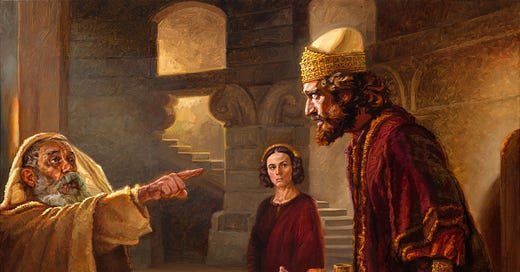Please take a look at some good advice. Try to look at it with new eyes: the eyes of both a Prophet and a King. Understand the actual act of prophesy. My thanks to Joe Nichols for the inspiration.
Well said! If anyone actually reads the Old Testament for meaning, this statement is the truth. King David sent a man to his death because he coveted the man’s wife. Nathan, the prophet, came to court and presented a case for the king. He told of two men. One was the largest owner of sheep in the kingdom. The other was an old man who had to his name — one lamb. He had raised that lamb like a child — in his home. It ate from his hand. It slept by his side. It was all he had.
The owner of the largest herd in the kingdom managed to wrest that lamb from the old man. Nathan then asked the king for a judgement. King David found for the old man. David’s judgment was that the large herd was to be given to the old man in reparation. Then, David then asked Nathan, the prophet: “who is this man who took the old man’s sheep”?
“You are!” said Nathan. For David had sent his general to the front of battle where he was slain. Then, David married the man’s widow, that he had impregnated while her husband was at war. Thus — the last of David’s line to rule was Solomon, David and Bathsheba's child. After that, the kingdom was split in two parts: Israel and Judah. Ultimately, the kingdom became a band of captured Israelis, living in exile — in Babylon.
(From old bible paintings: unlicensed, historically incorrect; but you get the picture.)
We all know that mis-interpretation happens. It happens because our understanding about anything is limited by the knowledge we’ve allowed into our brains. So — the need for new eyes and new ears* (*a suggestion from the New Testament). The problem is that it takes time, and more importantly, empathy, to come to any understanding at all that is not faulty. And we are surrounded daily with those who put peacock feathers* on in order to prove that they are not crows ( *see Aesop’s Tales for that reference). Another great reference* might be Othello’s error ( * see Shakespeare for that; or you might try “AnnaKaranina” for a 19th century re-interpretation.) And, for the record, you can find similar circumstances elsewhere. These stories, including “Holy” writings, are a record of what the human race has learned, and frequently, the hard way. If you can’t read and empathize with the characters — be they historical or fictional, you will miss what the story has for you. And there is always something there “for eyes that see and ears that hear” to use an old biblical metaphor.




